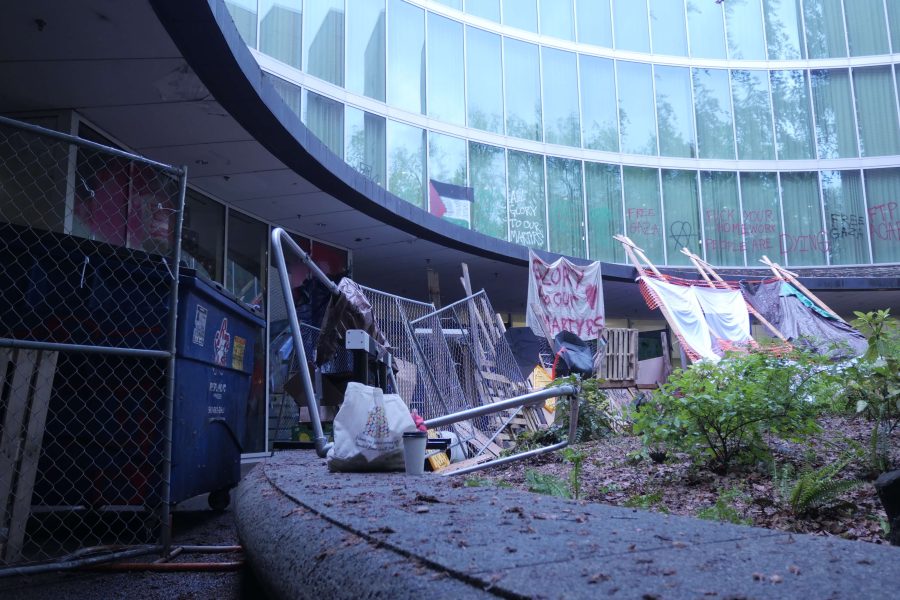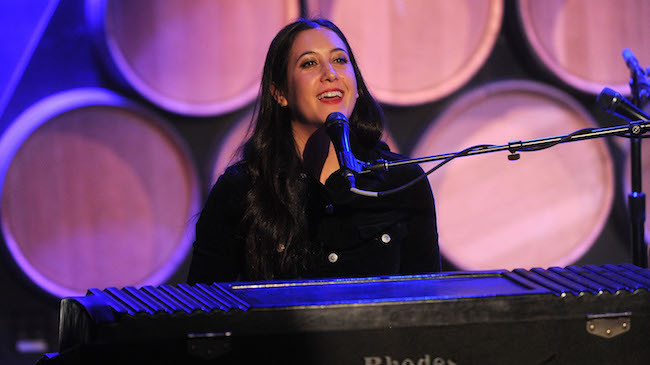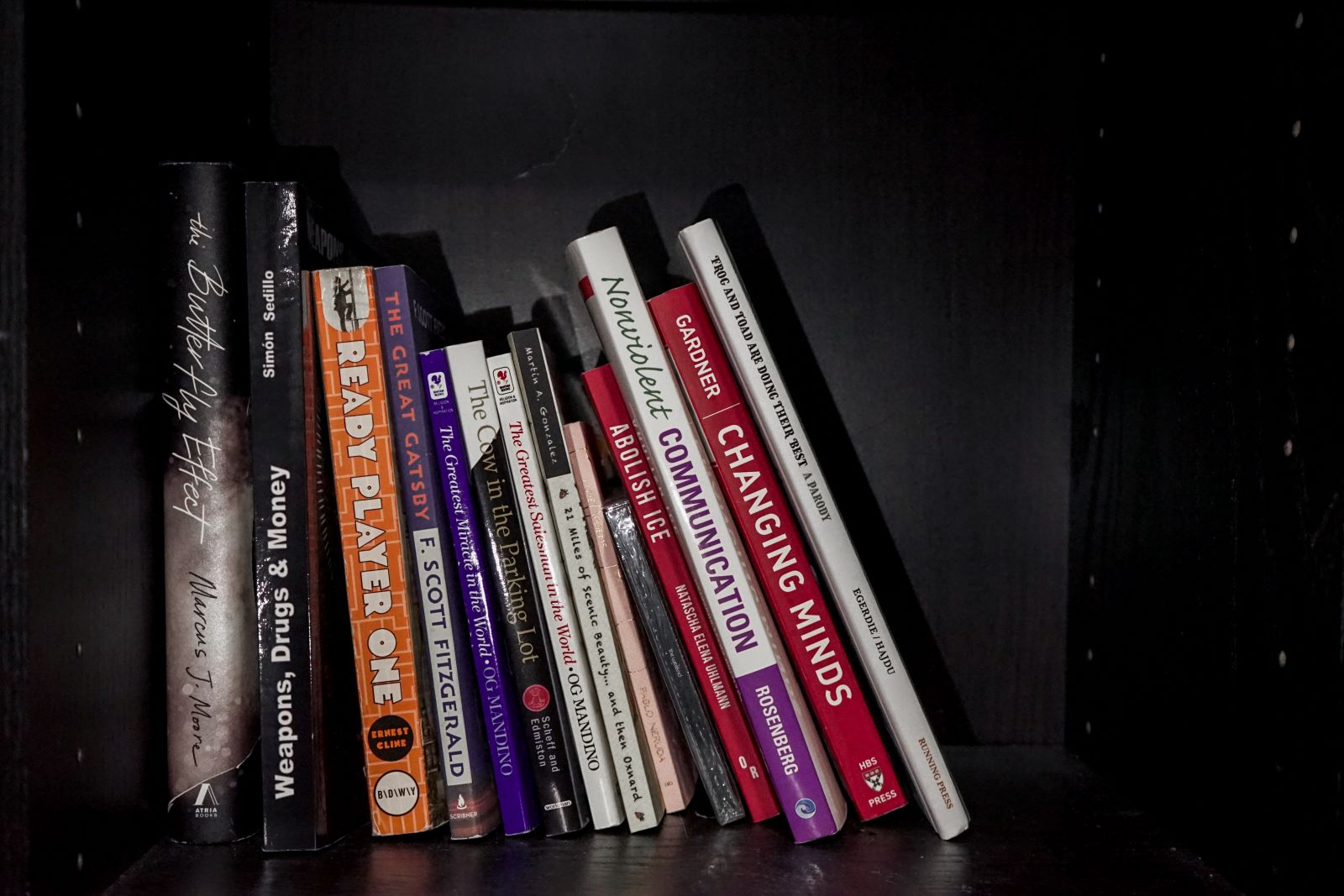Portland State’s The Merry Widow premiered on April 19 at Lincoln Performance Hall. The show is double-casted, with an opening night which sat a sea of attentive and excited attendees. The Merry Widow combined the traditional pageantry of classical opera with the gleefully unrestrained attitudes and melodrama of the swinging ‘60s.
The PSU student performers displayed monumental talent and passion on stage, providing an entertaining and refreshing performance overall.
Performer Serena Mason aptly described her and Megan Wakefield’s character—the titular widow, Hanna Glawari—as “stubborn yet compassionate, with a fiery spirit.”
Though the rest of the supporting cast performed wholeheartedly with thoughtfulness and sincerity, Wakefield’s Hanna Glawari was the uncontested star of the night. Fierce and charismatic, her voice generously delivered high notes which glistened as much as the jaw-dropping, flamingo-pink gown she wore during the first act.
“Once you have the story and everything in your body, you can just get lost in the character,” Mason said. For Mason, stage performance is all about entertaining as a collective. “It’s not about you anymore, and I think that’s what helps me. It’s about the story we’re telling, the messages that we’re trying to get across and how we present this beautiful music to this audience.”
The Merry Widow is set in Paris, France, and populated largely by ambassadors and politicians of the fictional Balkan nation of Pontevedro. The opera’s plot revolves around the efforts of Pontevedrian minister Baron Mirko Zeta—played by Izaak Thoms and Xavier Davidson—trying to keep the widowed Hanna—recently endowed with a substantial inheritance within the state—by marrying her to Count Danilo Danilovitch.
Johnny Derby embodies the role of Danilo, an affable playboy who enjoys indulging in both alcohol and scandalous flirtations. Derby characterizes Danilo as “suave, masculine and a true romantic.”
Hanna and Danilo’s stubborn reluctance to rekindle their previous romance causes the primary conflict in the story, with the characters’ premonitions blowing hot and cold—will they or won’t they?
The subplot has to do with the Baron’s wife, Valencienne—played by March Steiger and Krista Schaeffer—and her half-hearted attempts to prevent her extramarital affair from entering the public eye. Her lover is the charming French aristocrat Camille de Rosillon—played by Noe Ramirez Perez and Jere Burkholder.
On the surface, an opera combines elements from theater, dance and musicals. Those who have never seen an opera before may assume it’s simply a few hours of heavily made-up singers belting out extremely high notes, standing center stage and illuminated by a single spotlight, but it’s much more. According to Mason, the opera is “a balancing act of trying to make sure that everything is aligned.”
“It’s a monumental effort to put one of these on,” said Dan Wallace Miller, the opera’s stage director. “The complexity is seen in the stage props and costumes and shoes and makeup. Under the shining lights, you can see the passion that each character exudes.”
Miller is based in Seattle and has worked with renowned opera houses across the country. “I am continually astonished to be reminded that this is an undergraduate program,” Miller said about PSU’s Opera program. “This is by far the most robust opera program in the Pacific Northwest that I have worked with, and the fact that it is for undergraduate students really demonstrates this level of talent that this university attracts.”
The first note of the show instantly commands attention, reverberating through the air with shocking amplification and rich acoustics. “When you have an opera house that’s built for the sound, to be in the theater and hear the vibration in the hall [and] the sound waves hitting you a certain way and your chair vibrating… I mean, there’s nothing like that,” said Kelley Nassief, the opera’s artistic director. “You can’t get that from TV.”
“It’s such an experience to be in the theater and feel the energy,” Mason said. “It’s just different.” Indeed, the energy within the theater is palpable. Perhaps it’s because seeing an opera is an impermanent and uniquely communal experience.
“Opera is fundamentally about live performance,” Miller said. “There is something that is really beautiful about a live performance in that it only exists for the people watching it at that time. It coalesces from nothing and goes back into nothing.” The cast has one shot to make it right, and when you’re on stage there really is no hiding.
Dealing with the pressure of such a performance is no easy task. “You have to be a lot more prepared than you think you are,” Derby said. “When you get nervous, you won’t be taking as deep of breaths. You might get a little tired or restricted in your voice. The more prepared I am… the more I can just focus on the character and have fun.”
Though set in the 1960s, The Merry Widow still calls back to the heavily-perfumed operettas of the Edwardian era, with common tropes and archetypal personalities of the golden age of Viennese or Parisian theater. There are swooning pairs of young lovers, conflicts surrounding the conservation of wealth and the kind of gossip which only echoes through the walls of those who live in ivory towers.
However, The Merry Widow still manages to sneak in relevant and shrewd cultural and political ideas into the music, without coming off as didactic or overly intentional. The finished play finds moments where characters break the fourth wall, others where sarcasm is expressed in the rhythmic beauty of song.
There are some particularly stand-out numbers—one cleverly and hilariously dismantles masculine bravado, and another includes a titillating chorus of cabaret showgirls dancing like Rockettes.
“I made the decision to set it specifically after the point where women would have achieved suffrage, so after the 1940s, but before the point when they had financial autonomy, which happened in 1965,” Miller said. “Setting it after a world war, a global conflict and right on the cusp of this huge social movement puts this narrative in a fresher perspective… Also, it gives us a lot of excuses to do a lot of insanely crazy stuff with the sets and the costumes.”
After the first act, the performers come out sporting a delightful costuming coup—gone are the gaudy ball gowns and on with the Jackie Kennedy-esque, short, A-line dresses and matching hats.
In the third act, the audience is pleasantly surprised and amused by another set and costume change: showgirls scantily clad, superfluous men too familiar with cheeky sexual innuendos and the classic good-girl-gone-bad vivaciously showcased by Steiger.
“Opera can have a connotation now of having a really fixed aesthetic,” Miller said. “Big dresses, chandeliers… It has a tendency and a danger of becoming a little bit stodgy or formulaic. In particular, The Merry Widow is about a lot of things that no longer correlate with society today.”
“This is an opera about an Eastern bloc nation facing utter destitution, which is a bummer of a concept, but when you dredge it in champagne and booze, somehow, you get to forget those sorts of things,” Miller said.
A major inspiration behind Miller’s vision for The Merry Widow was the French movie director Jacques Demy, particularly Demy’s film The Young Girls of Rochefort. “There’s an aspect of Demy’s films—the concern about world-rendering events is assuaged with excessive amounts of aesthetic beauty,” Miller said.
And yes, this opera is aesthetically beautiful—though, this also speaks to the inherent satire of opera itself. “It creates a world in which we shouldn’t think about global conflict and a lot of horrible things happening, because everyone is so distracted by trying to appear glamorous,” Miller said.
While the production takes a new approach to classical themes, opera itself remains somewhat removed and inaccessible for many people—particularly younger generations. “The level of cultural evaluation of an art form like opera is on the decline in the United States,” Miller said. “It is something that is lacking from our early educational systems.”
If U.S. society’s esteem for performance art is, in fact, dying, “it is a cultural community issue,” Miller said. “Our civic arts—like opera houses, which exist as part of a city’s identity and infrastructure—need to be supported by educational efforts and by granting access to folks who might not have it.”
“I think opera was more familiar to people 35 years ago,” Nassief said. “People seek entertainment in a different way now than they did [in the past]. When I was younger, we didn’t have computers or cellphones, so going to see a show was more familiar to people.”
“There’s a patience factor,” Nassief said. “People like things to happen very quickly, and you have to sit in a theater and watch a show, but the reward when you do go experience a performance is so great once you’re there… Emotions haven’t changed very much, it’s just a different way of storytelling that I don’t think a lot of young people have exposure to.”
For Miller, this simple act of exposure to an opera production could open the door to an unknown passion. “I’m a firm believer that if you get a kid in a seat to watch a show, at the very least, that they probably won’t hate it,” Miller said. In fact, Miller noted that “the most effusive audiences of all my productions everywhere I go is always from the student audience.”
PSU’s production of The Merry Widow seeks to make opera approachable and engaging for opera fanatics and those who have never seen a live performance. “It just felt so fresh and new,” Nassief said. “The storytelling initially felt like it could be a little more accessible to younger audiences, so that was something that really lit me up when we were talking about the concept.”
A passionate love of music and a fascination with the stage certainly courses throughout PSU’s opera department. Simon and Garfunkel once sang the words—quite relevantly—“Is the theater really dead?” Going to see an opera such as The Merry Widow will answer that question. And the answer is seen most clearly in the audience’s response: an ardent standing ovation and a long-lasting smile on every face.






